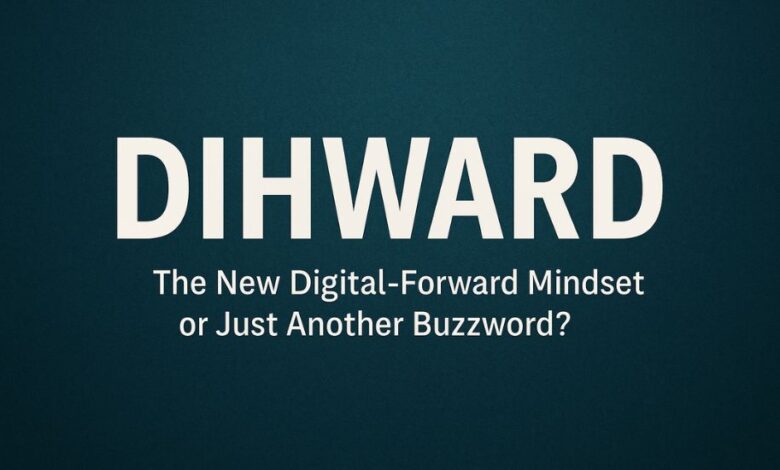Dihward: Exploring the Digital-Forward Mindset

The digital world moves quickly, and with it, a constant stream of new ideas, terminologies, and buzzwords. In the summer of 2025, one such term has begun surfacing across blogs and websites: “dihward.” Some writers present it as a groundbreaking philosophy; others see it as a fleeting SEO-driven trend. Regardless of its ultimate fate, “dihward” is gaining traction, and its rise reveals how online culture and digital strategies intersect.
This article takes a deep dive into what “dihward” is, how blogs are framing it, where it comes from, how it might be applied, and whether it’s truly a sustainable concept or merely a passing trend.
What Does “Dihward” Mean?
Most blog sources define dihward as a blend of digital intelligence, structure, and hard work. The idea is that progress in a tech-driven age requires not just smart tools, but also disciplined systems and the human capacity to work with purpose.
Other interpretations frame dihward as shorthand for “digital forward.” In this sense, it represents a mindset of proactively using technology—whether for personal productivity, business strategy, or creative pursuits—to stay ahead in an ever-changing digital economy.
Across definitions, several themes repeat:
-
Adaptability: applying structured thinking across multiple domains.
-
Integration: combining human effort with digital tools.
-
Future orientation: positioning individuals or organizations to thrive in a digital-first future.
Origins and Context
Unlike established philosophies or movements, dihward does not have a clear origin. Most blog writers admit the term’s roots are uncertain. Some speculate it is a modern coinage designed to capture attention in an increasingly crowded digital landscape. Others argue it could be a rebranding of long-standing productivity and digital-forward ideas.
The term first began appearing prominently in July and August 2025 across a cluster of new blog articles. The timing suggests coordinated promotion, with content optimized for SEO visibility. This raises the question: is dihward an organic idea spreading through genuine use, or is it largely a product of blog marketing strategies?
The Many Faces of Dihward
One reason the word sparks debate is that different blogs define it differently. Let’s look at some of the common angles:
-
Business & Growth Perspective
-
Sites like dihward.com and TechInfoBusiness position it as a framework for digital growth, emphasizing structured systems, clarity, and long-term planning.
-
In this interpretation, dihw ard becomes a kind of methodology for managers and entrepreneurs to adopt.
-
-
Personal Productivity
-
Several blogs discuss it as a mindset for individuals. They argue that di hward means combining digital tools with self-discipline to maximize productivity, organize personal goals, and remain consistent.
-
-
Cultural and Lifestyle Applications
-
Some lifestyle sites (e.g., Styles Magazine) extend the concept to family life, parenting, and relationships. For them, di hward is about applying structure and clarity in daily living.
-
-
Creative and Tech Innovation
-
Other writers highlight di hward as a way for creatives and developers to align their work with the future, combining imagination with technology in practical ways.
-
Examples of Application
To make the idea more concrete, here are some scenarios where di hward—if taken seriously—could be applied:
-
Startups: adopting a di hward approach by integrating AI tools into workflows while also emphasizing human creativity and problem-solving.
-
Education: encouraging students to use digital resources responsibly, balancing innovation with discipline.
-
Personal Life: using structured systems (apps, planners, time-tracking) not just to “stay busy” but to align daily tasks with long-term goals.
-
Creative Projects: using tools like generative AI or design software but anchoring them in clear project structures and deadlines.
Skepticism: Is Dihward Just a Trend?
Despite the positive framing, there’s a strong argument that dihward may be nothing more than a temporary blogosphere creation:
-
SEO-Driven Growth: The clustering of articles in mid-2025 suggests that websites are leveraging the novelty of the word to capture search traffic.
-
Lack of Clear Origin: Unlike established frameworks (like Agile, Lean, or Design Thinking), dihward doesn’t have a known founder, manifesto, or organization behind it.
-
Overlapping Definitions: Because it can mean different things—business method, productivity hack, or lifestyle choice—it risks being too vague to hold weight in the long term.
Writers such as those at RideAble note this skepticism directly, questioning whether di hward is a “passing trend or a lasting concept.”
Name Confusion: Dihward vs. DIH-Ward
Another wrinkle is the occasional confusion with “DIH-Ward,” which refers to Digital Innovation Hub partnerships in healthcare and neuro-rehabilitation. This has nothing to do with the philosophical buzzword, but the similarity could add to misunderstanding if readers search for the term.
Why It Matters Anyway
Even if di hward turns out to be a short-lived term, its rise illustrates several important realities about the digital age:
-
Language as Strategy: New words are created to shape perceptions, attract clicks, and differentiate brands.
-
Blurred Lines: A concept can be applied across business, lifestyle, and creative contexts, reflecting how digitalization touches every area of life.
-
The Hunger for Frameworks: People crave systems and mindsets that promise clarity amid technological chaos. Even if di hward is a repackaging, the interest it draws proves this demand.
A Balanced Take
So, how should we approach dihward?
-
Treat it as a lens, not a law. If the principles of combining technology, structure, and purpose resonate, then adopting di hward-like practices may be valuable.
-
Stay critical: Ask whether the term adds clarity or merely rebrands what you’re already doing.
-
Watch its trajectory: If di hward continues to spread into business literature, courses, or organizational strategies, it may solidify. If not, it will likely fade as many buzzwords do.
Conclusion
At its core, dihward is about aligning digital tools with human effort and purposeful structure. Whether you are running a startup, managing a team, or simply trying to organize your personal life, the di hward mindset encourages you to balance innovation with discipline.
Yet, the word’s sudden appearance, unclear origins, and varied definitions leave room for skepticism. Is it a truly new philosophy or just a clever SEO invention of summer 2025? Only time will tell.
Still, the fact that di hward is sparking discussion is itself meaningful. In a world hungry for frameworks to navigate the digital future, even a fresh buzzword can inspire reflection.
For deeper insights like this, continue exploring ideas on Blog Loom—your trusted space for breaking down new trends, philosophies, and digital-age concepts.
For more information visit Blog Loom .




